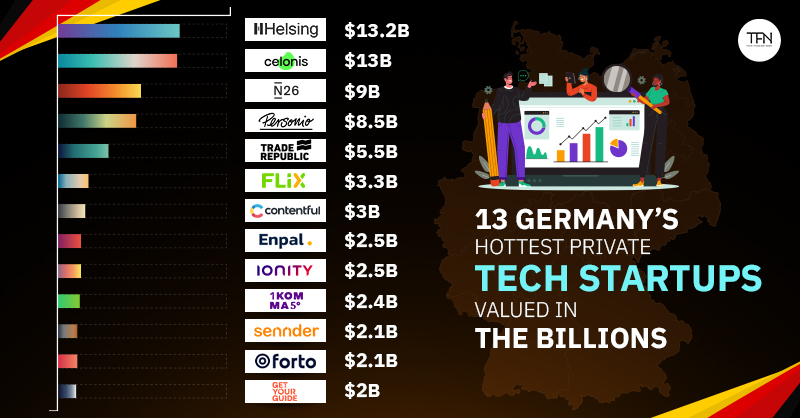When the US and UK startup scenes dominate the news, the quiet success of German startups can be overlooked, but Germany boasts one of Europe’s strongest startup economies.
The numbers of startups grow each year; the first half of 2025 alone saw over 1,500 new businesses founded. Backed by government policy, strong academic institutions, and a diverse, international population, it’s already produced some of the world’s best-known startups.
Here are twelve of the most successful German-founded tech startups.
Helsing
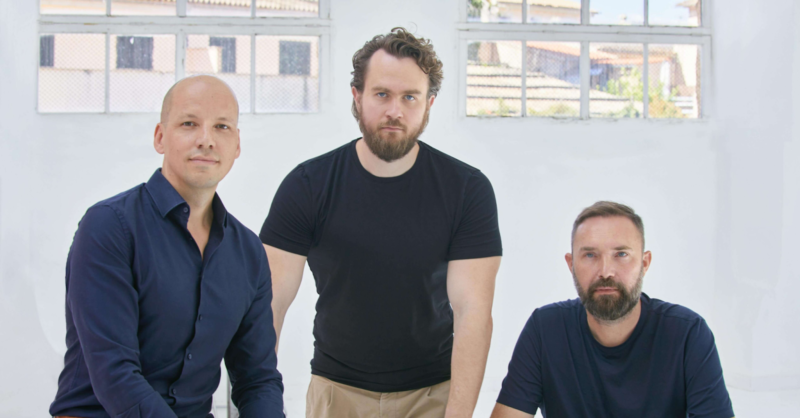
Founders: Torsten Reil; Gundbert Scherf; Niklas Köhler
Founded: 2021
Valuation: $13.2 billion
Munich-based Helsing may be one of those businesses you wish weren’t successful. Only founded in 2021, the defence tech has thrived in what is becoming a volatile and unpredictable world. Helsing’s core technology applies artificial intelligence to defence systems, while ensuring a human operator always retains final decision-making authority.
This “human-in-the-loop” approach sets Helsing apart from competitors such as Anduril Industries and Shield AI, which prioritise fully autonomous systems without the same degree of built-in oversight.
In its most recent funding round, Helsing raised €600 million in Series D backing, bringing its valuation to €12 billion and underlining investor confidence in its safety-first autonomy platform. Over the next year, the company plans to open a U.S. operations centre, integrate its software more deeply with existing military hardware, and pursue defence contracts across the Asia-Pacific region.
Celonis
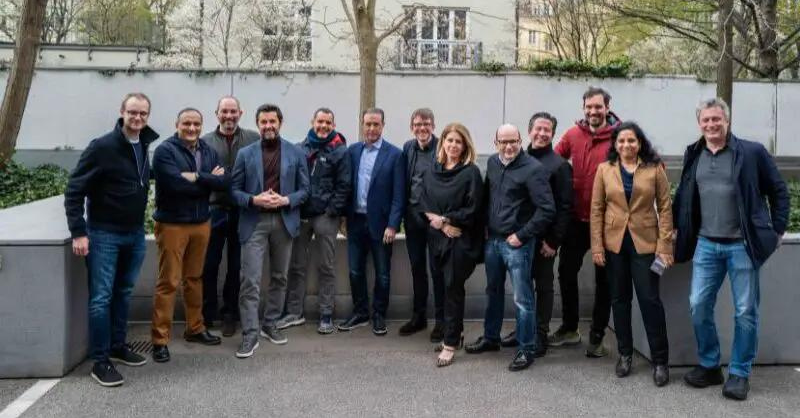
Founders: Alexander Rinke; Bastian Nominacher; Martin Klenk
Founded: 2010
Valuation: $13 billion
Celonis began at the Technical University of Munich before spinning out in 2011 under founders Alexander Rinke, Bastian Nominacher and Martin Klenk. Its process-mining software harvests event logs from enterprise systems to map workflows in real time, pinpoint bottlenecks and recommend fixes.
Unlike UiPath Process Mining or SAP Signavio, Celonis adds an execution management layer that automates corrective actions, closing the loop between insight and impact. It became the first startup from the programme to become a reseller on SAP in 2015, and by 2018 had reached a $1 billion valuation.
After undisclosed late-stage funding, Celonis now sits at a $13 billion valuation and employs over 3,000 staff. Next up are AI-driven auto-remediation features, deeper SAP OEM integration and an expansion into factory-floor process optimisation.
N26
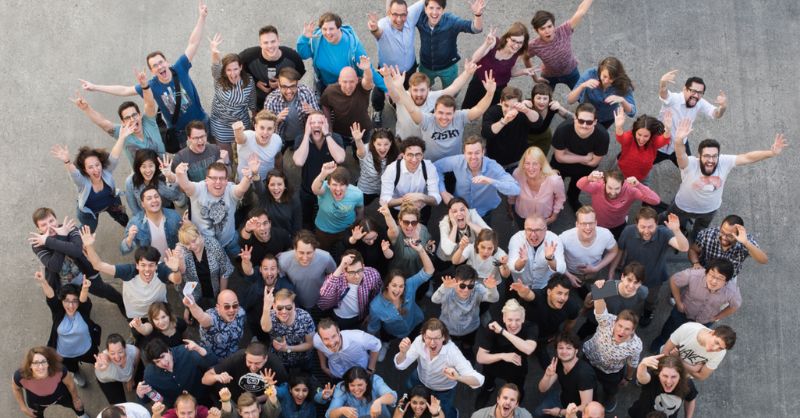
Founders: Valentin Stalf, Maximilian Tayenthal, Rocket Internet
Founded: 2013
Valuation: $9 billion
When Valentin Stalf and Maximilian Tayenthal launched N26 in 2013, they set out to strip away banking’s complexity with an app built on a full German banking licence. Real-time transaction alerts, in-app analytics and fee-free foreign withdrawals soon won over millions of customers across 24 countries.
Unlike Revolut or Monzo, which compete on multi-currency accounts and trading, N26 keeps its focus on seamless checking and savings, complemented by premium metal cards and dedicated customer support.
After hitting profitability in 2024, the Berlin-based neobank closed its last round at a $9 billion valuation. Its roadmap includes bespoke SME accounts, AI-powered expense categorisation and entry into Latin American markets.
Personio
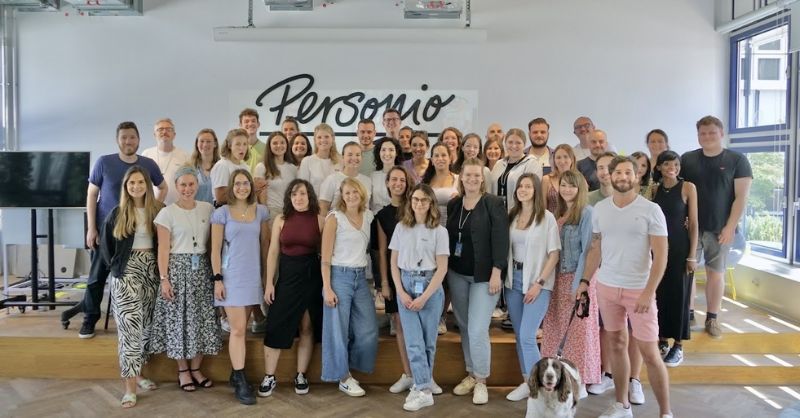
Founders: Hanno Renner, Roman Schumacher, Arseniy Vershinin, and Ignaz Forstmeier
Founded: 2015
Valuation: $8.5 billion
Personio was born in 2015 when Hanno Renner, Roman Schumacher, Arseniy Vershinin and Ignaz Forstmeier set out to replace clunky, paper-based HR with a single cloud platform for recruiting, onboarding, payroll, time tracking and performance reviews. Its modular design and strict adherence to European labour laws set it apart from BambooHR, Workday and Factorial.
A $200 million Series E round this summer valued Personio at $8.5 billion, and the company now employs 1,800+ people across Europe and the U.S. In the coming year, Personio will add AI-driven talent-match recommendations, prepare for its North American debut, and pilot blockchain-based credential verification.
Trade Republic
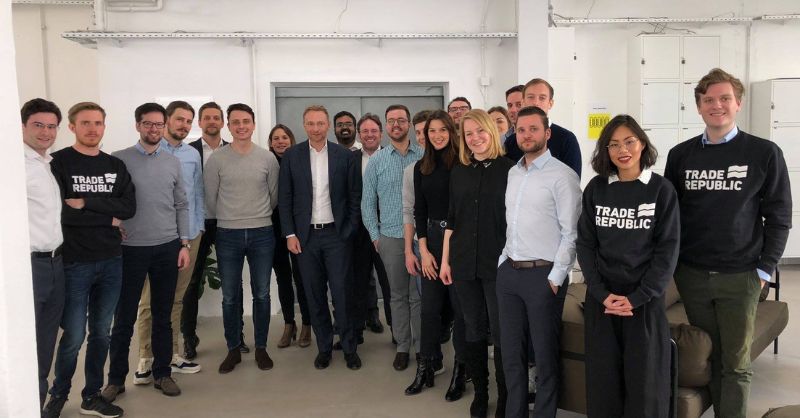
Founders: Christian Hecker, Thomas Pischke, and Marco Cancellieri
Founded: 2015
Recent funding: $5.5 billion
Commission-free trading arrives in Europe courtesy of Trade Republic, founded by Christian Hecker, Thomas Pischke and Marco Cancellieri in 2015. A full banking licence underpins its app, which offers stocks, ETFs, and derivatives without fees, as well as fractional-share trading that appeals to first-time investors.
Unlike Robinhood or eToro, Trade Republic emphasises robust EU compliance and a simple, mobile-first interface. Managing over €100 billion in assets, the Berlin-based broker plans to launch crypto derivatives, roll out AI-driven portfolio insights and expand into Southeast Asia.
Flix
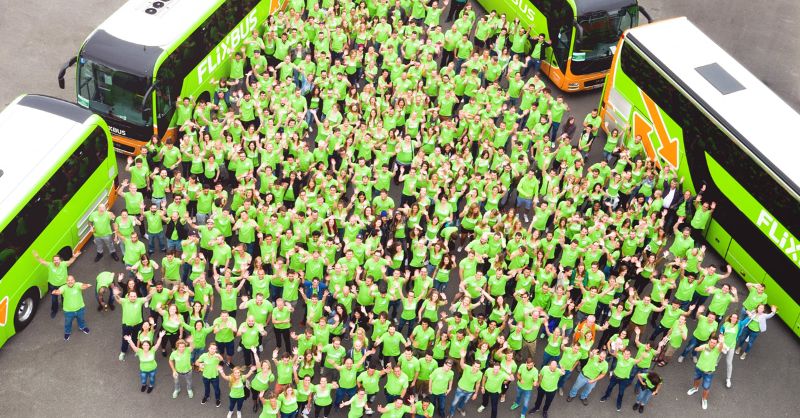
Founders: André Schwämmlein; Jochen Engert; Daniel Krauss
Founded: 2011
Valuation: $3.3 billion
Three friends, André Schwämmlein, Jochen Engert and Daniel Krauss, launched Flix in 2011 to capitalise on Germany’s deregulated bus market. Today, neon green FlixBuses and FlixTrains crisscross Europe, North America and Asia, carrying more than 80 million passengers annually.
An asset-light approach, dynamic routing and app-based ticketing distinguish Flix from BlaBlaCar’s peer-to-peer model and legacy carriers like Greyhound. With a $3.3 billion valuation, the company is electrifying one-third of its fleet, introducing FlixRail high-speed services and setting sights on Latin America by 2027.
Contentful
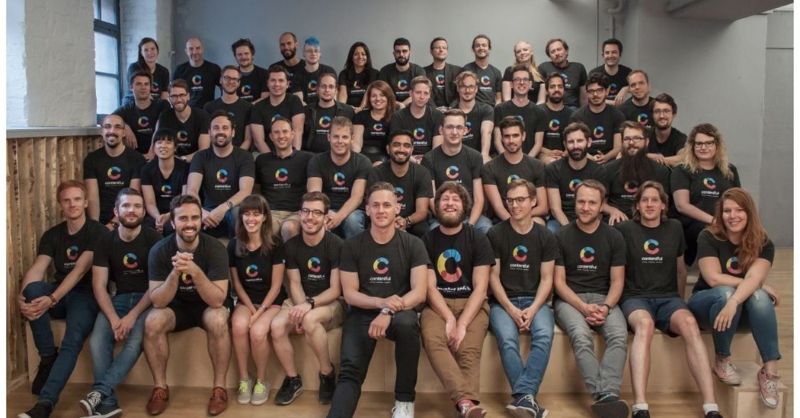
Founders: Sascha Konietzke; Paolo Negri
Founded: 2013
Valuation: $3 billion
Berlin’s Sascha Konietzke and Paolo Negri launched Contentful in 2013 to free developers from monolithic content management systems. Their headless CMS delivers content via APIs, enabling teams to publish seamlessly across web, mobile and IoT channels. This developer-first approach gives Contentful an edge over Adobe Experience Manager and Contentstack, both of which impose heavier legacy architectures.
After a $175 million Series E round that valued the company at $3 billion, Contentful is adding automated content drafting powered by natural-language processing, embedding advanced analytics and opening a new R&D lab in Berlin.
Enpal

Founders: Mario Kohle, Jochen Ziervogel, and Viktor Wingert
Founded: 2017
Valuation: $2.5 billion
Enpal’s founders, Mario Kohle, Jochen Ziervogel, and Viktor Wingert, built a solar-plus-storage subscription service in 2017 that allows homeowners to go carbon-neutral without incurring upfront costs.
Solar panels, batteries, heat pumps and EV chargers are all covered under a flat monthly fee, while Enpal aggregates installations into a virtual power plant. This end-to-end subscription model sets Enpal apart from Tesla Energy, SolarEdge and Sonnen.
After raising €110 million at a $2.5 billion valuation, Enpal aims to hit 500 MW of virtual power-plant capacity, launch in Italy and Spain, and integrate AI-based energy forecasts by 2026.
IONITY
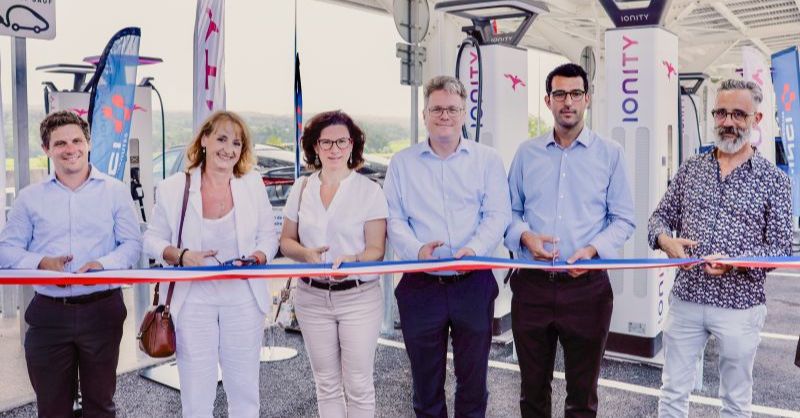
Founders: BMW Group; Daimler AG; Ford Motor Company; Volkswagen Group
Founded: 2017
Valuation: $2.5 billion
Automakers BMW, Daimler, Ford and Volkswagen teamed up in 2017 to form IONITY, Europe’s high-power EV charging network. With chargers delivering up to 350 kW and an open-roaming model, IONITY serves all electric vehicles, unlike Tesla’s Superchargers, which remain proprietary.
Supported by EU grants and a BlackRock investment, IONITY now operates 4,000+ points across 24 countries. By 2027, it plans to install an additional 1,000 ultra-fast chargers, source all power from renewable sources, and integrate charging billing with train ticket systems for seamless intermodal travel.
1KOMMA5°

Founders: Philipp Schröder; Jannik Schall; Philip Liesenfeld
Founded: 2021
Valuation: $2.4 billion
Hamburg’s 1KOMMA5° launched in July 2021 to make buildings carbon-neutral through Heartbeat, its AI-powered energy-management platform. Heartbeat orchestrates solar panels, batteries, heat pumps and EV chargers to optimise consumption and feed surplus power back to the grid.
Unlike Vivint Solar or Enphase, whose solutions stop at hardware, 1KOMMA5° offers a subscription covering installation, maintenance, and AI control. Following €150 million in pre-IPO funding (total equity raised exceeding €650 million), the company targets an IPO in 2026, aims to double its virtual power-plant capacity to 1 GW, and plans to expand into France and the Benelux region.
Sennder
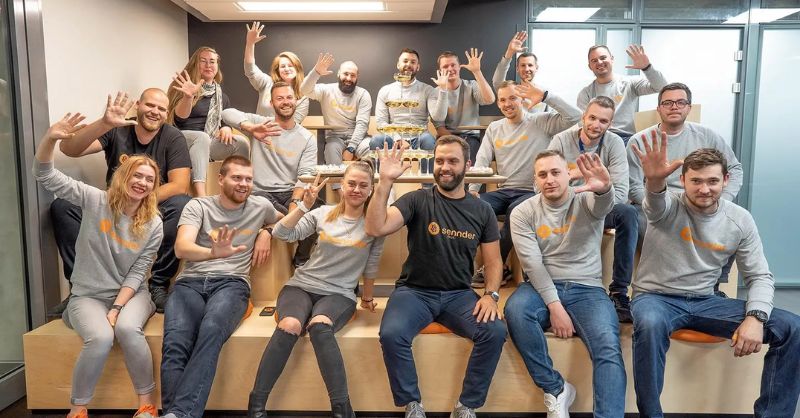
Founders: David Nothacker, Julius Köhler and Nicolaus Schefenacker
Founded: 2015
Valuation: $2.1 billion
David Nothacker, Julius Köhler and Nicolaus Schefenacker founded Sennder in 2015 to digitise Europe’s fragmented road freight market. Their platform automates load matching, dynamic pricing, and real-time tracking, setting Sennder apart from multi-modal players like Convoy or Flexport by focusing on road transport.
With €1.4 billion in revenue last year, Sennder is now developing rail and barge booking modules, launching carbon-tracking dashboards for shippers and preparing for an IPO in 2026.
Forto
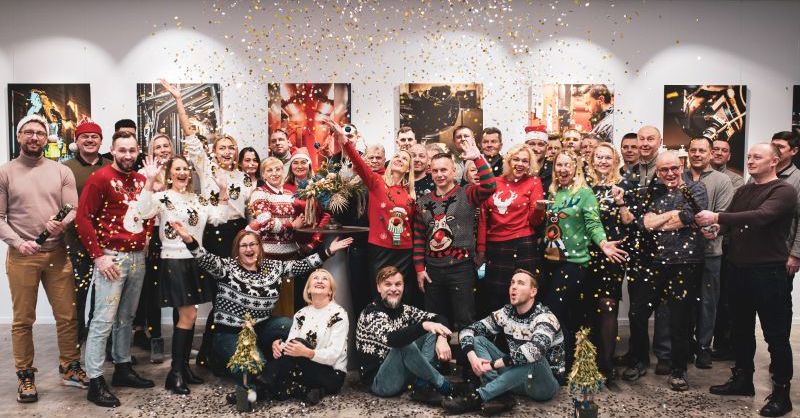
Founders: Erik Muttersbach, Ferry Heilemann, Michael Wax, and Dr. Fabian Heilemann
Founded: 2015
Valuation $2.1 billion
Forto was created in Berlin in 2015 to streamline global logistics with an API-first platform that handles ocean, air and overland shipments. By embedding real-time visibility, exception alerts, and cargo financing into a single interface, Forto outpaces traditional forwarders like DHL or Kuehne + Nagel, as well as newer rivals such as Flexport and Shipwell.
A $240 million Series C round valued the company at $2.1 billion, and Forto now plans to launch a carbon-offset marketplace, expand its Asian logistics hubs and deploy predictive delay analytics.
GetYourGuide
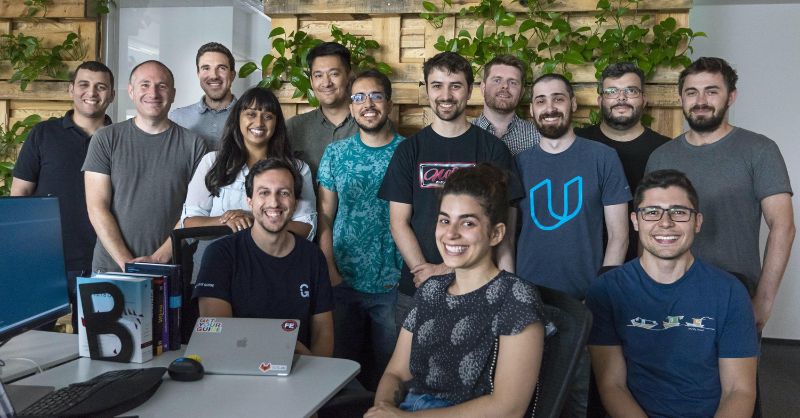
Founders: Johannes Reck; Tao Tao; Martin Sieber; Pascal Mathis
Founded: 2009
Valuation: $2 billion
GetYourGuide began in 2009 when Johannes Reck, Tao Tao, Martin Sieber and Pascal Mathis let travellers book guided tours online. Today, the platform lists over 100,000 experiences worldwide and uses machine-learning recommendations to match activities with user interests. Personalisation and a seamless mobile checkout set GetYourGuide apart from Viator, Klook, and Airbnb Experiences.
Following a $100 million Series F round that valued it at $2 billion, the company will roll out a B2B API for partners, launch augmented-reality city tours and enter select African markets by 2026.
